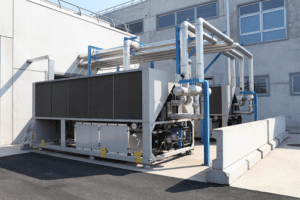Your business relies on high-quality central heating systems to stay warm in the winter. Without your air staying the right temperature, you can upset clients and lose customers. Naturally, you want a system that suits your needs, but how do you choose the right commercial heating system for your business? While you’ll need a qualified HVAC contractor to help you select a specific model, we can help you decide on the type of system. Below, we review several of the key factors in determining the various heating systems on the market.
Understanding the Major Factors
 As you may already know, various types of commercial heating systems have different requirements. Naturally, each kind is best suited to a unique array of conditions. Therefore, an excellent first step towards deciding on a type of system is to understand the various factors that play a role in your heating system’s functionality:
As you may already know, various types of commercial heating systems have different requirements. Naturally, each kind is best suited to a unique array of conditions. Therefore, an excellent first step towards deciding on a type of system is to understand the various factors that play a role in your heating system’s functionality:
- Building Load – Larger businesses or those with substantial open spaces such as warehouses and department stores have a large amount of building load. What this means for your heating system is that is must work significantly harder to maintain a comfortable temperature. Further, larger buildings may experience temperature differentials between different rooms, so you may need a system that can account for this issue. Generally, the larger the building load, the more powerful your system must be.
- Weather Conditions – Obviously, businesses in areas that experience drastically cold winters must sacrifice some efficiency for raw power. In contrast, businesses in more temperate climates can easily use less powerful systems that save money on the power bill. Additionally, the amount of sunlight that your business is exposed to may permit you to install a solar heating system that can augment your primary HVAC system.
- Adjacent Land – Some businesses are in tall buildings found in urban settings. Others have campuses that span acres. Most of the businesses seeking new heating systems fall somewhere in between. If you are heavily constrained in terms of the ground nearby, that can impact the kind of system that could work for you. On the other hand, if you are close to a body of water, then a new door opens to you in the form of water-based geothermal heating.
- Budget – This factor is often an overwhelming one. Some systems are much more expensive to install despite saving money overall. Thus, businesses may often lean away from a new system that requires a substantial capital outlay. Take a moment to figure out what your budget is and how important it is that you find a system that minimizes your ongoing energy bill.
Once you figure out where you stand for each of these categories, you’re well-positioned to select your commercial heating system.
The Benefits of Each Commercial Heating System
Next, we will briefly review the most common types of commercial heating systems. Most businesses will use one of the following kinds:
- Forced Air – This kind of commercial heating system involves heating air in a central location, then distributing it throughout your business using a series of ducts. It tends to be one of the swiftest systems in terms of achieving a temperature change, but it also has some downsides. For example, the interior temperature within a room may vary depending on proximity to the air vent. Additionally, these systems tend to be less energy-efficient than radiant systems. The most common power sources for forced air include:
- Oil
- Natural Gas
- Electricity
- Solar Power
- Radiant – While less common than forced air, radiant heat is still a viable option for many businesses. Rather than directly heating air and blowing it to various zones using a series of fans, radiant heat uses circulation and convection to heat rooms. Instead of ductwork, you will have pipes in the walls or beneath the floor that contain hot water or another vector. The pipes will then radiate heat into the room without the need for a fan. Generally, this process takes longer, but it may be a good choice for smaller businesses or those that don’t see many customers or clients pass through its doors. You can find several sub-variations of radiant heat, using energy sources such as:
- Oil
- Electricity
- Geothermal
The biggest decision is figuring out whether your business would be better served by forced-air or radiant heat. If you’re looking to minimize your capital expenditure and your business already has either ductwork or radiant piping, you should likely consider a newer model of the same kind of system. There are also some more modern innovations and less common systems, so your business may benefit from one of those alternatives, as well.
Choosing the Right Commercial Heating System
As you were reading the above, you likely realized which general kind of commercial heating system would be best suited for your business. Nevertheless, you may not be sure about which energy source will strike the right balance between ongoing expenses and effectiveness. Further, there may be governmental incentives available for systems that use renewable energy such as solar or geothermal energy. Contact a qualified HVAC technician to get the most accurate information regarding your heating system.

